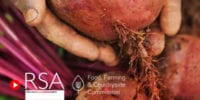Social enterprise as a catalyst for sustainable and healthy local food systems
CUSP partnering in new UKRI research project investigating the potential of social enterprises as agents for healthy and sustainable food systems.
April 2022

As part of the UKRI Transforming UK Food Systems programme, CUSP researchers at Middlesex University (lead) and the University of Surrey (co-lead), together with colleagues at Glasgow Caledonian University and Shared Assets have been awarded funding to investigate how social enterprises can bring innovations in healthy and sustainable food.
The scale of change needed to transform UK food systems for health, social justice and environment requires fresh ideas, new organisational models and collaborative approaches that can meaningfully engage individuals and communities. Existing top-down approaches to the challenge of sustainable food provision and diet have failed to tackle the crisis of poor dietary health and sustainable food production. The project will focus on the distinctive role of social enterprises (i.e. trading organisations with a core social and environmental purpose), exploring and enhancing their unique contribution to food systems that are more inclusive, sustainable and healthy. The research will investigate social enterprises providing community growing spaces and distribution schemes, leisure and fitness centres, children’s nurseries and other community-based services.
The interdisciplinary team will work closely with six partner social enterprises: Community Transport Glasgow (tackling access to affordable food), Cultivate Powys (local growing and social prescribing), London Early Years Foundation (nursery chef initiative), Selby Trust London (food and community hub), Social Adventures Salford (therapeutic growing and local food hub) and Windmill Hill City Farm Bristol (growing space and community hub).
Research findings will be used to co-design resources and toolkits to support the scaling-up and/or replication of successful models and innovations and the sharing of good practice across the country. This is not without its challenges of course, and part of the project will be to examine the various barriers and constraining factors and how they can best be addressed. In addition to good practice guides for social enterprises and other organisations across the country, policy briefings will be prepared, focusing on the different levels of local, regional and national policy making.
Further details about the project will be shared shortly. For enquiries, please email info@cusp.ac.uk.



